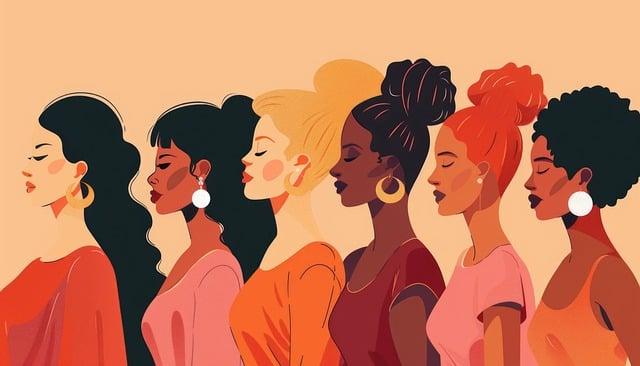In the vibrant tapestry of Pakistan’s society, where traditions intertwine with modern aspirations, the issue of gender disparity casts a long shadow over progress and potential. As the nation grapples with a rapidly evolving landscape marked by economic ambitions and cultural complexities, the persistent challenges faced by women and gender minorities emerge as both a call to action and a mirror reflecting deep-seated inequalities. This article embarks on a journey through the intricate maze of gender dynamics in Pakistan, shedding light on the obstacles that stand in the way of equitable opportunities. By exploring the historical context, current realities, and potential pathways forward, we aim to unravel the multifaceted issues underpinning gender disparities, illuminating the urgent need for inclusive dialogue and transformative change.
Understanding the Roots of Gender Inequality in Pakistan
To truly grasp the complexities of gender inequality in Pakistan, it’s essential to explore its historical, cultural, and socio-economic underpinnings. Traditionally, the societal norms that have shaped gender roles stem from a confluence of historical practices and religious interpretations. These norms often position women in subordinate roles within both the family and community structures, limiting their access to education, healthcare, and economic opportunities. Particularly in rural areas, the cultural constraints can be more rigid, perpetuating cycles of disempowerment. As a result, women’s voices are frequently marginalized, and their contributions to society remain largely unrecognized.
The impact of economic disparities further exacerbates gender inequalities, as women frequently face systemic barriers when entering the workforce. Several factors contribute to this phenomenon, including:
- Lack of Education: Many girls are unable to complete primary education due to socio-economic challenges.
- Societal Expectations: Cultural pressures often dictate that women remain at home for family duties.
- Limited Legal Protection: Insufficient laws addressing workplace discrimination can dissuade women from pursuing careers.
- Access to Resources: Economic resources are often controlled by male relatives, limiting women’s autonomy.
These intertwined challenges reveal a persistent cycle of inequality, where awareness and policy interventions are critical to dismantling existing barriers and fostering an environment that promotes gender equity.

Empowering Women Through Education and Economic Opportunities
Education is a powerful tool that can transform a woman’s life, shaping not only her destiny but also the future of her family and community. In Pakistan, where the gender gap in education remains a pressing issue, enhancing access to quality education for girls becomes imperative. Challenges such as traditional stereotypes, socio-economic barriers, and inadequate infrastructure often hinder girls from pursuing their studies. However, innovative solutions such as community-based schooling, scholarship programs, and digital learning initiatives are emerging as key strategies to thwart these obstacles. By fostering an inclusive learning environment, we can inspire young women to realize their potential and to pursue careers that were once deemed unattainable.
Equally important are the economic opportunities available to women, which serve as the backbone of their empowerment. To bridge the gap between education and economic participation, we must invest in programs that prioritize vocational training, entrepreneurship, and access to financial services. By equipping women with practical skills and resources, they can enter the workforce with confidence or start their own businesses. Notably, when women are economically empowered, the positive ripple effects contribute to community development and national growth. To illustrate the potential impact, consider the following table showcasing the benefits of :
| Benefit | Impact |
|---|---|
| Higher Income Levels | Boosts household income and reduces poverty. |
| Increased Health and Well-being | Improves family health outcomes and access to healthcare. |
| Enhanced Community Development | Drives local economies and fosters social cohesion. |
| Intergenerational Benefits | Improves education and opportunities for future generations. |

Addressing Health Disparities: The Path to Gender Equitable Healthcare
Efforts to achieve gender equitable healthcare in Pakistan must confront systemic barriers that contribute to health disparities. The intersection of gender with socio-economic status, geography, and education creates a complex web of challenges that disproportionately affects women. Cultural norms often limit women’s access to healthcare services, resulting in delayed treatments and inadequate medical attention. To break this cycle, it is crucial to provide comprehensive education and awareness programs that emphasize the importance of health services for all genders. Additionally, policymakers must work towards formulating inclusive healthcare policies that recognize and address these disparities head-on.
A multifaceted approach is essential to ensure that healthcare systems are equitable and accessible. Key elements include:
- Community Engagement: Involving local communities in health initiatives to increase awareness and utilization of services.
- Training Healthcare Providers: Offering gender sensitivity training for medical staff to improve the quality of care.
- Policy Development: Crafting policies that mandate gender-responsive healthcare strategies and allocate resources effectively.
Only through a concerted effort among governments, healthcare providers, and communities can we hope to dismantle the barriers to gender equitable healthcare and pave the way for healthier futures for all individuals in Pakistan.

Policy Frameworks for Gender Equality: Strategies for Sustainable Change
Addressing the multifaceted challenges of gender disparities in Pakistan requires a robust policy framework that integrates gender considerations into every sector. Effective strategies must encompass comprehensive legislation aimed at protecting women’s rights, fostering economic empowerment, and enhancing access to education. Key initiatives include:
- Strengthening Legal Frameworks: Reinforcing laws related to gender-based violence and workplace discrimination.
- Enhancing Educational Opportunities: Implementing scholarship programs aimed at girls in rural areas.
- Promoting Economic Participation: Supporting women-led small and medium-sized enterprises (SMEs) through tailored financial products.
To ensure the sustainability of these changes, alignment with international standards and best practices is crucial. Moreover, fostering collaboration among governmental bodies, civil society, and the private sector can drive culturally sensitive initiatives that resonate with local communities. Consider the following approaches to reinforce these strategies:
| Approach | Impact |
|---|---|
| Community Engagement Programs | Increases awareness and support for gender equality. |
| Capacity Building Workshops | Empowers women with essential skills and knowledge. |
| Public-Private Partnerships | Facilitates resource sharing and innovation for women’s initiatives. |
In Retrospect
As we draw the curtains on our exploration of gender disparities in Pakistan, it becomes evident that the journey toward equality is fraught with multifaceted challenges. The striking dynamics of tradition, culture, and modernity create a complex tapestry that both hinders and shapes progress. Yet, amid these obstacles, there lies a resilient spirit—one that yearns for change, empowerment, and justice.
Our understanding of these disparities is only the beginning. As individuals, communities, and nations, it is our collective responsibility to recognize the innate potential within every person, regardless of gender. The road ahead may be long and winding, but with concerted efforts in education, policy reform, and societal engagement, Pakistan can embrace a future where equality is not just an aspiration, but a reality.
In navigating this intricate landscape, let us champion the voices of those who have long been silent and challenge the narratives that perpetuate inequality. Together, we can illuminate the path toward a more inclusive tomorrow—one where the rich tapestry of Pakistan is woven with the threads of equity, respect, and shared opportunity. The challenges are great, but so too are the possibilities. It is time to venture forth, united in purpose and bold in action.



